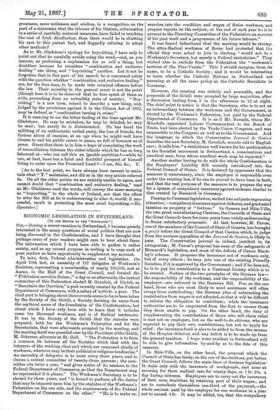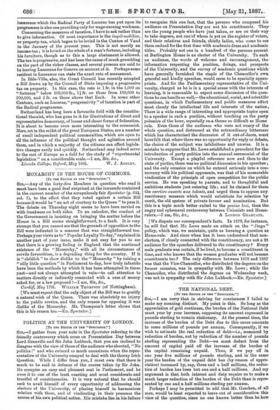ECONOMIC LEGISLATION IN SWITZERLAND.
[To 1112 EDITOR C. ,"rallorrrox.-]
Sra,—During a recent vacationin Switzerland, I became greatly interested in the many questions of social politics that are now being discussed in the Confederation, and I have thought that perhaps some of your readers might care to hear about them. The information which I have been able to gather is rather scanty, and so my second purpose in writing ie to urge such of your readers as have opportunity to supplement my account.
To take, first, Federal administration and legislation. On April 10th last, an assembly of 197 delegates of Workmen's Societies, representing a membership of nearly 100,000, met at Aaron, in the Hall of the Great Council, and formed the " FaSration ouvri6re Suisse ;" a day or so afterwards, the central committee of this Federation elected M. Greulich, of Zurich, as " Secretaire des Onvriers," a post recently created by the Federal Department of Commerce, with a salary of 4,000 fr. a year. The chief part in bringing about these events seems to have been taken by the Society of the Griitli, a Society deriving its name from the mythical scene of the foundation of the Confederation, but about which I have only been able to learn that it includes some ten thousand workmen, and is of Radical tendencies. It was by the Society of the Grath that the statutes were prepared, both for the Workmen's Federation and for the Secretariats, that were afterwards accepted by the meeting, and the meeting itself was presided over by the President of the Griitli, M. Scherrer, advocate at St. Gall. " The Federation is to form a common tie between all the Societies which deal with the interests of the working class and which are composed chiefly of workmen, whatever may be their political or religions tendencies." An assembly of delegates is to meet every three years, and to choose a central committee of twenty-three persons ; the com- mittee sits twice a year, "and gives notice of its sessions to the Federal Department of Commerce, so that the Department may be represented if it please." The Workmen's Secretary is to be elected for three years, and " is bound to perform all the duties that may be imposed upon him by the statutes of the Workmen's Federation on the one side, and the requirement's of the Federal 53epartment of Commerce on the other." "He is to make re-
searches into the condition and wages of Swiss workmen, and prepare reports on the subject; at the end of each year he is to present to the Directing Committee of the Federation an account of his past work and a programme of his future labours."
It was feared beforehand that the meeting would be stormy. The ultra-Radical workmen of Berne had protested that the official they were asked to join in electing " would not be a Workmen's Secretary, but merely a Federal statistician." They wished also to exclude from the Federation the " workmen's sections of the Pins-Verein." This I should imagine, from its name, to be a Catholic Society ; and it would be interesting to learn whether the Catholic Bishops in Switzerland are pursuing at all the same policy as the Catholic Socialists in Germany.
However, the meeting was orderly and peaceable, and the proposals of the Griitli were accepted by large majorities, after a discussion lasting from 2 in the afternoon to 12 at night.
The chief point to notice is that the Secretary, who is to act as an intermediary between the workmen and the Government, is elected by the Workmen's Federation, but paid by the Federal Department of Commerce. It is as if Mr. Barnett, whom Mr. Mundella appointed Labour Correspondent to the Board of Trade, had been elected by the Trade-Union Congress, and was responsible to the Congress as well as to the Government. And the language in which the Conservative Journal de Geneve describes the new Secretary, M. Greulich, sounds odd to English ears ; it calls him "a statistician well known for his participation in the Socialist movement in Switzerland, a conscientious and practical man, from whom excellent work may be expected."
Another matter having to do with the whole Confederation is the Employers' Liability Bill recently introduced into the Federal Council of States. It is declared by opponents that the measure is unnecessary, since the employer is responsible even under the existing law, if he can be proved to have been in fault, and that the real purpose of the measure is to prepare the way for a system of compulsory insurance against sickness similar to that created by Bismarck in Germany.
Passing to Cantonal legislation, we find two subjects engrossing attention,—compulsory insurance against sickness, and graduated taxation on property or "fortune." In Geneva and Bale-Ville, the two great manufacturing Cantons, the Councils of State and the Great Councils have for some years been vainly endeavouring to frame satisfactory proposals. At last, however, M. Favon, one of the members of the Council of State of Geneva, has brought a projeg before the Great Council of that Canton which, to judge from the anxious opposition of the Journal de Geneve, is likely to pass. The Conservative journal is, indeed, justified in its antagonism ; M. Favon's proposal has none of the safeguards of Bismarck's legislation, and most of the defects of Canon Black- ley's scheme. It proposes the insurance not of workmen only, but of every citizen ; he may join one of the existing Friendly Societies, if it is approved by the Government ; and if he does not,
he is to pay hie contribution to a Cantonal Society which is to be created. Neither of the two principles of the German law—
the responsibility of the workman, and the responsibility of the employer—are enforced in the Genevan Bill. For, on the one hand, those who are moat likely to need assistance will often escape from contributing; the German plan of subtracting the contribution from wages is not adopted, so that it will be difficult to enforce the obligation to contribute; while the insurance authorities are to be empowered from the first to excuse those they deem unable to pay. On the other hand, the duty of supplementing the contributions of those who will claim relief is cast not on employers, but on the well-to-do citizens, who are expected to pay their own contributions, but not to apply for relief; the insurance fund is also to be added to from the income of the Hospice Grateral, and any deficit is to be made up from the general taxation. I hope some resident in Switzerland will be able to give information by-and-by as to the fate of this measure.
In BAle-Ville, on the other hand, the proposal which the Council of State has lately, on the eve of the elections, put before the Great Council, follows the main lines of German legislation• It deals only with the insurance of workpeople, and aims at securing for them medical care for ninety days, or 1 fr. 20c. a day during sickness. Employers are to carry out the insurance of their men, doubtless by retaining part of their wages ; and are to contribute themselves one-third of the payment,—the whole amount paid by the employer for one workman in a year not to exceed 4 fr. It may be added, too, that the compulsory insurance which the Radical Party of Lucerne has put upon its programme is also one providing only for wage-earning workmen.
Concerning the measures of taxation, I have to ask rather than to give information. Of most importance is the impSt =Wier, or property-tax, which began to be levied in the Canton of Vaud in:the January of the present year. This is not merely an income-tax ; it is levied on the whole of a man's fortune, including his furniture, though as to this a large abatement is allowed. Tiie tax is progressive, and has been the cause of much grumbling on the part of the richer classes, and several persons are said to be leaving Lausanne for Geneva on account of it. Perhaps some resident in Lausanne can state the exact rate of assessment.
In also, the Great Council has recently accepted a Bill drawn up by the Council of State imposing a progressive tax on property. In this case, the rate is 1 fr. in the 1,000 on " fortunes " below 100,000 fr., II fr. on those from 100,000 to 200,000, and 2 fr. on those above that limit. In some other Cantons, such as Lucerne, " progressivity " of taxation is part of the Radical programme.
Switzerland has long been a favourite field with the constitu- tional theorist, who has gone to it for illustrations of direct and representative democracy, of looser and closer forms of federation. It is about to become even more interesting to the economist. Here, set in the midst of the great European States, are a number of small independent political communities, which are open to all the influence of the political thought and agitation around them, and in which a majority of the citizens can effect legisla- tive changes easily and quickly. Switzerland may indeed serve to the rest of Europe as a field for the study of "experimental legislation" on a considerable scale.—I am, Sir, &c., Lincoln College, Oxford, May 10th. W. J. AsaLyr.



















































 Previous page
Previous page